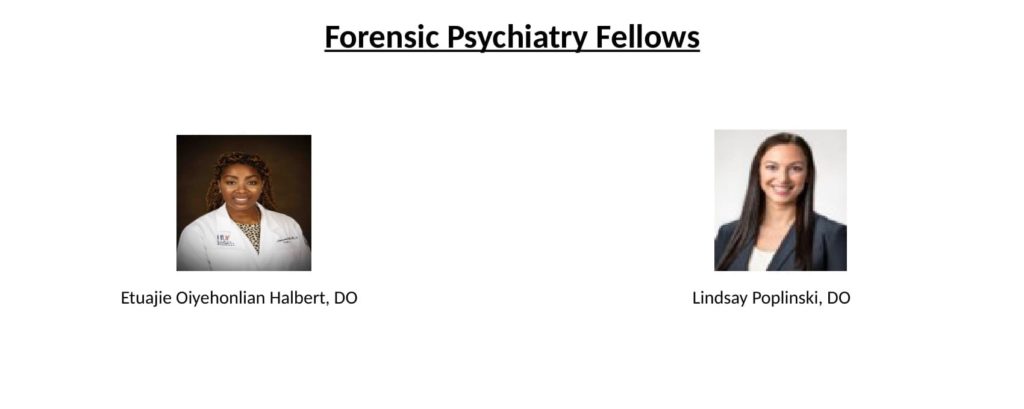Forensic Psychiatry Fellowship Program
The Saint Elizabeths Hospital Forensic Psychiatry Fellowship Program is a one-year ACGME-accredited program designed to train and foster the development of forensic psychiatrists with interests across the entire range of forensic scholarship.
About Our Program
The Saint Elizabeths Hospital Forensic Psychiatry Fellowship Program is a one-year ACGME-accredited program designed to train and foster the development of forensic psychiatrists with interests across the entire range of forensic scholarship. During their time in the program, fellows:
- Obtain an understanding of criminal and civil law, legal systems, and reasoning
- Attain an appreciation for the interplay of legal issues in psychiatry, including civil commitment, criminal competencies, and criminal responsibility; disability; correctional health; malpractice; and the regulation of medicine
- Expand their understanding of topics unique to forensic assessment, from answering ultimate questions to applying nomothetic research to individual cases
- Improve their skills in forensic interviewing and assessment, in courtroom testimony and informal communications with the Court or referral source
- Gain experience in correctional psychiatry, treatment, risk assessment, formulary restrictions, prison culture, and sentencing issues
- Develop administrative and consultative skills necessary for conducting institutional consultations in a public sector setting
- Learn behavioral strategies that support clinicians and units in the management of challenging forensic patients
- Further their abilities in lecturing, teaching, consulting, report-writing skills
The experiential component includes rotations within the DC Department of Behavioral Health, including Saint Elizabeths Hospital itself, the Assessment Center (Child/Families), local court clinics, Unity Health Care/District of Columbia Correctional Facility, and exposure to experts in military and private forensic practice. Fellows gain experience conducting forensic inpatient assessment and treatment, monitoring long-term insanity acquitted patients, conducting child and adolescent forensic evaluations, and performing inpatient and outpatient competency evaluations and civil commitment evaluations. Fellows testify in court and gain experience in numerous pre- and post-adjudication interactions with the judicial system. Private cases include malpractice litigation in addition to civil and criminal forensic assessment.
The faculty includes both forensic and child/adolescent forensic psychiatrists who are committed to education and scholarship and the career development of their fellows. Specific faculty interests include ethics, the regulation of psychiatry, the insanity defense, outpatient commitment, violence risk, sovereign citizens, and physician health.
Salary
$82,807.00
Fellow salary increases are determined every three years through collective bargaining between the residents/fellows and the District of Columbia.
The fellowship program also provides:
- $500 yearly stipend for books and educational materials for all residents
- $300 reimbursement eligibility for conference/training attendance (presentation not required)
- $1850 reimbursement eligibility for conference/training presentation
Benefits & Discounts
Our fellows are employed by the District of Columbia, which means they have access to numerous employee benefits and discounts.
Benefits
- Health insurance: DC pays 75% of premium
- Dental insurance: DC pays 100% of premium
- Vision insurance: DC pays 100% of premium
- Paid Family and Medical Leave (up to 8 weeks)
- Inova Employee Assistance Program
- Residents can use this program to get direct assistance or referrals for a variety of services including confidential counseling, legal services, financial services, child care, elder care, and work-life services.
- Deferred Compensation Plan
- Reimbursement of parking at clinical sites and mileage between sites
Optional benefit programs available for residents to enroll in include:
- Healthcare Flexible Spending Account
- Dependent Flexible Spending Account
- Short-Term and Long-Term Disability Insurance
- Term Life Insurance (DC pays 1/3 of premium)
- Employer-Assisted Housing Program
- DC College Savings Plan
- Savings Bond Program
Discounts
Health & Wellness | Technology | Travel | |
· 24 Hour Fitness · DC Row · DPR Fitness Center Deduction · Gold’s Gym · LA Fitness · MINT Health Club · VIDA Fitness · Washington Sports Clubs | · Apple Purchase Program · AT&T · Dell Purchase Program · HP Purchase Program · Sprint · T-Mobile Advantage · Verizon Fios | · Avis Car Rental · Budget Rental Car · Capital Bikeshare Membership · Hertz Rental Car · Hotels.com · Zipcar Membership | |
Entertainment | Work-Life | ||
· DC United · King’s Dominion · Six Flags America · Tickets at Work · Washington Nationals | · EagleBank Mortgage Options · Gifts.com · Luther Sales Purchase Program · Personal Creations · ProFlowers · Shari’s Berries | ||
Leave
Residents have a variety of leave options to use in order to maintain a healthy work-life balance while in residency training:
- 13 days of annual leave per year for personal time off
- 13 days of sick leave per year for health appointments and emergencies
- 10 days of exam leave per year for licensing exam preparation and completion
- 7 days of education leave per year for attending conferences and trainings
- 11 paid DC Government recognized holidays off per year
International Applicants
Our fellowship program accepts qualified applicants with the following visa statuses
- J-1 visa sponsorship through ECFMG
- H-1B visa
Contact Us
Further inquiries regarding the application process should be directed to:
Forensic Psychiatry Fellowship
Philip J Candilis MD
Saint Elizabeths Hospital/DC Department of Behavioral Health
1100 Alabama Ave SE, Ste 238
Washington, DC 20032
Tel: (202) 299-5421
Fax: (202) 561-6953
E-mail: philip.candilis@dc.gov
Recent Fellowship Publications
AAPL Practice Guideline for Forensic Psychiatric Evaluation of Defendants Raising the Insanity Defense
Journal of the American Academy of Psychiatry and the Law, 42:S3-S76, 2014.
Sanchez L, Candilis P, Arnstein F, Bresnahan L, Eaton J, Chinman G. “Effectiveness of a unique support group for physicians in a physician health program.”
Journal of Psychiatric Practice, 22(1): 56-63, 2016.
Candilis P, Dyer A, Noorani F, Ghabra M, May C. “A Hippocratic Oath for humanitarian aid workers.”
The Pharos, Summer 2018: 12-18.
Candilis P, Gray SA, Howe E, Sisti D. “Psychiatric professionalism for the 21st century.”
Psychodynamic Psychiatry, 46(4): 537-548, 2018
Dhumad S, Candilis P, Dyer A, Cleary S, Khalifa N. Risk factors for terrorism: a comparison of family, childhood, and personality factors among Iraqi terrorists, murderers, and controls. Behavioral Sciences of Terrorism and Political Aggression, doi: 10.1080/19434472.2019.1591481
Secarea C, Cleary S, Candilis P. Predicting competence restorability and length of time to restoration.
Journal of Forensic Sciences, accepted
Winner of 2019 AAFS Best Paper by a Fellow
Sidhu N, Candilis P. A feminist perspective for forensic practice.
Journal of the American Academy of Psychiatry and the Law, 46(4): 438-47, 2018
Candilis PJ, Kim DT, Sulmasy LS; ACP Ethics, Professionalism and Human Rights Committee.
Physician Impairment and Rehabilitation: Reintegration Into Medical Practice While Ensuring Patient Safety: A Position Paper From the American College of Physicians.
Annals of Internal Medicine. June 4, 2019. doi: 10.7326/M18-3605
Candilis P, Neal T. “Not just welfare over justice: ethics in forensic consultation.”
Legal and Criminological Psychology, 19: 19-29, 2014
Johnson NR, Candilis P. Outpatient competence restoration: a model and outcomes
World Journal of Psychiatry, 5(2): 228-233, 2015
Candilis P. Physician health and professional secrecy
Psychiatric Times, 32(13):20A-F, 2015
Candilis P. Physician health and the social contract
AMA J of Ethics, 18(1):77-81, 2016
Candilis P, Sidhu N. Ethics at the women’s march.
American Academy of Psychiatry and the Law Newsletter, 42(2): 16, 2017
Candilis P. Ethics at the march for our lives.
American Academy of Psychiatry and the Law Newsletter, 43(3): 17, 2018
Candilis P, Khurana G, Leong G, Weinstock R. “Informed consent at gunpoint: When Psychiatry affects gun ownership.”
Behavioral Sciences and the Law, 33(2-3): 346-355, 2015
Candilis P, Pivovarova E. “Safety monitoring and withdrawal of psychiatric research participants.”
in The Oxford Handbook of Psychiatric Ethics, J. Sadler, W. Fulford, W. Van Staden eds., Oxford University Press, online publication date Dec 2014, 2015
DeRenzo E, Candilis P. “Ethics of early intervention in psychosis.”
in The Oxford Handbook of Psychiatric Ethics, J. Sadler, W. Fulford, W. Van Staden eds., Oxford University Press, online publication date Jan 2015, 2015
Candilis P, Huttenbach E. “Ethics of correctional psychiatry.”
In The Oxford Textbook of Correctional Psychiatry, R. Trestman, K. Appelbaum, J. Metzner eds., Oxford University Press, 41-46, 2015 (Winner of 2016 Guttmacher Award)
Chapter nominated for 2014 Paul Briscoli Award (faculty-student collaboration)
Way B, Candilis P. “The challenges of research in correctional psychiatry.”
in Principles and Practice of Forensic Psychiatry (3d ed), R Rosner, C Scott eds., Chapman & Hall, 2017
Weinstock R, Darby C, Candilis P, Piel J, Leong G. “Ethical guidelines in forensic psychiatry.”
in Principles and Practice of Forensic Psychiatry (3d ed), R Rosner, C Scott eds., Chapman & Hall, 2017
Weinstock R, Candilis P, Leong G. “Ethics in geriatric forensic psychiatry.”
in The Oxford University Press Textbook of Geriatric Forensic Psychiatry, Holzer J, Kohn R, Ellison J, Recupero P. (eds). Oxford, 2018 (Winner of 2019 Guttmacher Award)
Abubaker K, Jones T, Candilis P. “Geriatric forensic psychiatry research.”
in The Oxford University Press Textbook of Geriatric Forensic Psychiatry, Holzer J, Kohn R, Ellison J, Recupero P. (eds), Oxford 2018 (Winner of 2019 Guttmacher Award)
Williams D, Candilis P. “Ethics in forensic medicine.”
in The Encyclopedia of Global Bioethics, ten Have H (ed), Springer, 2016
Candilis P, Sidhu N. “Ethics.”
in Primer of Mental Health Practice and the Law, R Schouten (ed), Oxford University Press, 2017
Schouten R, Candilis P. “Civil commitment.”
in Primer of Mental Health Practice and the Law, R Schouten (ed), Oxford University Press, 2017
Candilis P, Martinez R. “Recent developments in forensic psychiatry ethics.”
in Bearing Witness to Change in Forensic Psychiatry Practice, EEH Griffith, M Norko, A Buchanan (eds), CRC Press, Taylor and Francis, 2017
Sidhu N, Candilis P. “Feminism, ethics, and forensics: A guide for practitioners.”
In Ethics Frontiers in Forensic Psychiatry, EEH Griffith (ed), Springer, forthcoming
Candilis P, Martinez R. “Ethics and forensic psychiatry.”
In Psychiatric Ethics, 5th ed., S Green, S Bloch (eds), Oxford, in press
Martinez R. Candilis P. “Narrative ethics.”
In Psychiatric Ethics, 5th ed., S Green, S Bloch (eds), Oxford, in press
Kushner D, Candilis P. “Ethics analysis of lone-actor terrorism and society’s response.”
In Lone-Actor Terrorism: An Integrated Framework, Holzer, Recupero, Gill, Dew (eds), Oxford, forthcoming
Candilis P. “Arriving at an ethics of global mental health.”
In Dyer A, Kohrt B, Candilis P (eds). “Ethics of Global Mental Health,” Springer Publishing Co., in press
Stolar A, Candilis P, Frierson R, Edgar L. “Forensic milestones – experience after one year.”
Academic Psychiatry, 41(6): 789-792, 2017
Weissman A, Candilis P. “Humane forensic practice serves social justice.”
Journal of the American Academy of Psychiatry and the Law, 46(4): 454-457, 2018
Candilis PJ, Sulmasy LS. “Physician impairment and rehabilitation.”
Ann Intern Med. 2019 Nov 5; 171(9): 681-682. doi: 10.7326/L19-0554
Candilis P, Cleary S, Dhumad S, Dyer A, Khalifa N. Classifying terrorism: Toward an empirical typology.
Criminal Behavior and Mental Health. Submitted.
Sales E, Candilis P. The compassionate use of force.
AMA J of Ethics, Submitted.
Rachiotis G, Syrgavi C, Symvoulakis EK, Candilis P. Burnout among Greek substance use personnel during the economic crisis.
Frontiers in Public Health, Submitted.
Hume M, Candilis P, Amara S, Hobart K. A national survey of psychiatric ethics committees.
Psychiatric Clinics of North America. In preparation.
Dyer A, Kohrt B, Candilis P (eds). “Ethics of Global Mental Health,” Springer Publishing Co., in press
Forensic Psychiatry Fellowship Program Directors & Staff
 Philip Candilis, MD (Forensic Psychiatry Fellowship Program Director)
Philip Candilis, MD (Forensic Psychiatry Fellowship Program Director)
Dr. Candilis is Director of Medical Affairs and Director of the Forensic Psychiatry Fellowship Program. Recent fellows at the Saint Elizabeths program have studied and published on competence restoration, social justice, and feminist theory under his mentorship. Dr. Candilis holds academic appointments at George Washington University School of Medicine (Professor of Psychiatry), Howard University College of Medicine (Clinical Professor of Psychiatry), and the Uniformed Services University of Health Sciences (Adjunct Professor of Psychiatry). A former Fellow in Medical Ethics at Harvard Medical School, Dr. Candilis completed his residency and chief residency at Massachusetts General Hospital, and his forensic fellowship at the University of Massachusetts Medical School. Dr. Candilis is President of the Washington Psychiatric Society and the Hellenic American Psychiatric Association.
A strong advocate for the public sector, Dr. Candilis is responsible for articulating professional standards for physician health, forensic psychiatry, and general psychiatry through a number of medical organizations, including the American College of Physicians, the American Psychiatric Association, and the American Academy of Psychiatry and the Law. Current projects include the improvement of competence assessment and restoration in public psychiatry (a SAMHSA Learning Collaborative), a textbook on global mental health, and an analysis of terrorism data from Iraq.
 Ronald Schouten, MD, JD (Forensic Psychiatry Fellowship Program Co-Director)
Ronald Schouten, MD, JD (Forensic Psychiatry Fellowship Program Co-Director)
Ronald Schouten, M.D., J.D., is the Director of the Forensic Psychiatry Fellowship Program at St. Elizabeths Hospital in Washington, DC and Director Emeritus of the Law & Psychiatry Service of the Massachusetts General Hospital (MGH). He was previously Director of the MGH/HMS Forensic Psychiatry Fellowship Program. He remains on staff at MGH and is currently an Associate Professor of Psychiatry at Harvard Medical School. Dr. Schouten is board certified in psychiatry and forensic psychiatry, and is licensed to practice medicine in Massachusetts, New York, California, and the District of Columbia.
Dr. Schouten has played a key role in the development of a number of innovations in the teaching of forensic mental health issues. These include a grand rounds program on mental health issues for Massachusetts’ judges, a Harvard Medical School Continuing Education Program held for legal professionals, the Harvard Medical School Forensic Psychiatry Fellowship, and numerous teaching programs for the Law & Psychiatry Service and Harvard Medical School. He has been a Knowles Scholar in the Faculty of Arts and Sciences at Harvard College, where he taught a Freshman Seminar entitled “Responsibility, the Brain, and Behavior” and previously taught a seminar on terrorism with Jessica Stern, Ph.D. He co-developed and co-taught the Managing Workplace Conflicts Program for the Massachusetts Medical Society. Dr. Schouten is Forensic Column Co-Editor for the Harvard Review of Psychiatry.
Dr. Schouten was the mental health liaison for the Association of Trial Lawyers of America to the September 11 Victims’ Fund and served on consensus panels drafting guidelines on workplace violence for the FBI and the American Society for Industrial Security. He participated in the Office of the Director of National Intelligence Summer Hard Problem Programs entitled “Biological Warfare Perpetrators: Rationality, Culture, and Likelihood of Discovery”(2008) and “Nuclear Attribution in Nuclear Forensics and Intelligence Analysis” (2009) He has presented to government and civilian audiences regarding personnel reliability programs, insider threat, and countering violent extremism and has served as a panelist and contributor at workshops sponsored by the National Institutes of Health and Department of Defense (“The Neurobiology of Political Violence: New Tools, New Insights”), DTRA and DOE (“Human Reliability/Insider Threat Technical Exchange”), F.B.I. (“Making Prevention a Reality: Identifying, Assessing, and Managing the Threat of Targeted Attacks”), and the Nuclear Threat Initiative (Second China-U.S. Track II Dialogue on Nuclear Security). From 2009 to 2011, Dr. Schouten served as a member of the Amerithrax Expert Behavioral Analysis Panel. He serves as the mental health consultant to threat assessment teams of multiple corporations and educational institutions. He has worked with the U.S. Attorney’s Office in Boston on countering violent extremism programs and is a member of the MassBay Threat Assessment Team based in the Boston FBI Field Office. He participated in the expert panel that produced the 2019 publication “Mass Violence in America” from the National Council for Behavioral Health.
Dr. Schouten is the Immediate Past President of the New England Chapter of the Association of Threat Assessment Professionals and now chairs ATAP’s Legislative Affairs Committee. He is the co-author of “Almost a Psychopath: Do I (or Does Someone I Know) Have a Problem with Manipulation and Lack of Empathy” (Hazelden/Harvard Health Publications, 2012) and edited “Mental Health Practice and the Law” (Oxford University Press, 2017.)
Reetika Morgan
Forensic Psychiatry Fellowship Program Coordinator
Michelle Singletary
Forensic Psychiatry Fellowship Program Specialist
Coordinator
Kelecia Smith
Forensic Psychiatry Fellowship Designated Institutional Official
Class of 2024

